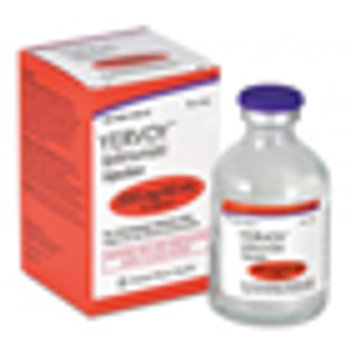
Patients with advanced melanoma treated with ipilimumab may be able to survive up to 10 years, according to the results of a study presented at the 2013 European Cancer Congress.

Your AI-Trained Oncology Knowledge Connection!


Patients with advanced melanoma treated with ipilimumab may be able to survive up to 10 years, according to the results of a study presented at the 2013 European Cancer Congress.

Asking patients to track their nausea and vomiting after a course of chemotherapy helped the health care team to adjust medications and achieve better control of symptoms, according to the results of a small single center study.

A new study of the relationship between BRAF V600E mutation status and its effect on papillary thyroid carcinoma found a negative association with clinicopathologic features suggestive of more aggressive disease.

T-DM1, a combination drug of trastuzumab and a cell-killing drug emtansine, significantly improved progression-free survival in women with advanced HER2-positive breast cancer whose cancer has recurred or progressed despite previous treatments, according to the results of the TH3RESA trial.

Long-term safety and efficacy results of two phase II trials indicate that dose-dense anthracycline-based chemotherapy with doxorubicin and cyclophosphamide can be safely combined with anti-HER2 therapy in women with early breast cancer.

A new meta-analysis indicated that people with diabetes are not only at an increased risk of developing breast and colon cancer, but are also at an increased risk of dying from the diseases.

The use of altered fractionation radiotherapy increased overall survival in patients with locally advanced head and neck cancers when compared with standard radiation, according to the results of a meta-analysis presented on Saturday at the 2013 European Cancer Congress in Amsterdam.

The addition of the oral pan-deacetylase inhibitor panobinostat to bortezomib helped to elicit responses in about one-third of heavily pre-treated patients with multiple myeloma who were refractory of bortezomib, according to the phase II results of the PANORAMA 2 study.

The use of GM2-KLH/QS-21 vaccination in stage II melanoma patients did not improve outcomes, according to the results of the EORTC 18961 phase III trial.

The use of a centralized nurse-led telephone-based care coordination system failed to improve outcomes including quality of life, unmet supportive needs or visits to the emergency department after surgical resection of colorectal cancer, according to the results of a new study.

Pomalidomide, an immunomodulatory drug, combined with low-dose dexamethasone improved progression-free survival in patients with refractory or relapsed and refractory multiple myeloma compared with standard of care high-dose dexamethasone, according to a new study.

The results of the study comparing Aveo’s tivozanib to sorafenib for the treatment of metastatic renal cell carcinoma showed no improvement in overall survival, the basis for the FDA’s rejection of the company’s new drug application earlier this year.

Combining four cycles of docetaxel and cyclophosphamide with 1 year of trastuzumab may be a viable treatment option for women with HER2-amplified early-stage breast cancer regardless of their TOP2A status, according to the results of a phase II study.

Older patients with melanoma were diagnosed with thicker melanomas, and experienced longer time to excision and a higher frequency of insufficient excision margins compared with their younger counterparts in a multicenter study in France.

A head-to-head comparison of pazopanib and sunitinib for the treatment of metastatic renal cell carcinoma showed that the two drugs resulted in similar progression-free survival, but also indicated that pazopanib may have a favorable safety profile.

About 40% of women experienced a change in at least one biomarker from primary to residual breast cancer after undergoing neoadjuvant chemotherapy, according to the results of a study presented at the ASCO Breast Cancer Symposium.

Two studies presented at the ASCO Breast Cancer Symposium 2013 focused on studying cognitive function in women with early-stage breast cancer, focusing on the relationship between perceived and measurable cognitive decline, and factors that may help to predict cognitive decline.

The exposure of the heart to radiation during radiotherapy for ductal carcinoma in situ (DCIS) did not increase cardiovascular mortality or morbidity, according to a study by researchers in the Netherlands.

More than 90% of women about to undergo a mammography were unable to accurately quantify their risk for breast cancer, either over- or underestimating their risk, according to the results of a large-scale survey presented at the ASCO Breast Cancer Symposium 2013.

Expert radiologists were able to screen magnetic resonance images and rule out breast cancer diagnosis with a negative predictive value of about 99% using an abridged breast MRI protocol in a single-center study presented Saturday at the ASCO Breast Cancer Symposium 2013.

Patients with multiple myeloma who underwent autologous stem cell transplantation may have a continued response to the treatment even after the traditional disease assessment at 100 days. A new study indicates that this continued response maintained prognostic value and should be taken into account when considering post-transplant therapies.

Results of the PrefHer study indicated that when given the option between subcutaneous trastuzumab and intravenous trastuzumab, significantly more patients with HER2-positive breast cancer preferred the subcutaneous administration.

Researchers in China have found that the use of [18F] fluorodeoxyglucose PET/CT detected a greater number of distant metastases than conventional work-up imaging in patients with nasopharyngeal carcinoma.

Researchers in London have identified a number of new genetic variants that are linked to myeloma, and one specifically linked to a telomerase RNA component gene called TERC, that helps to control the aging process by acting as a cell’s internal clock.

Researchers in Canada have shown for the first time that the incidence of HPV-related oropharyngeal cancers is increasing among the Canadian population.

A retrospective analysis of the HERA trial indicated that young age was not associated with early recurrence in women with HER2-positive breast cancer, despite previous research suggesting that young age at diagnosis might be a risk factor for recurrence and death.

Researchers found that circulating cell-free DNA could represent a possible predictive marker of response in advanced melanoma patients treated with dabrafenib.

Being offered a brief, dedicated discussion of end-of-life decisions relatively early in the trajectory of advanced cancer led to an earlier placement of do-not-resuscitate orders and decreased the likelihood that patients died in a hospital, a new study showed.

A study defining patterns of recurrence in node-negative breast cancer patients could help guide surveillance recommendations and future therapeutic approaches.

Surgeons saw advantages in robotic, over laparoscopic, ultrasound probes during robotic partial nephrectomy, and similar perioperative outcomes and margin rates.